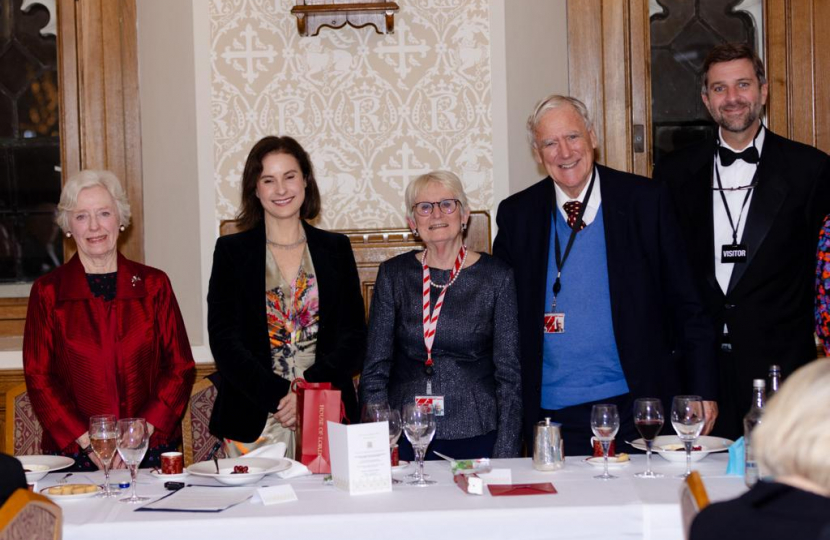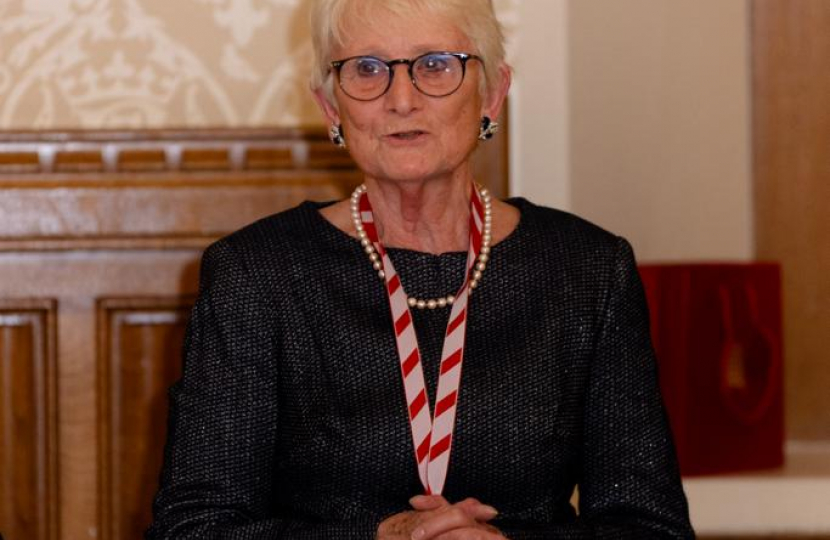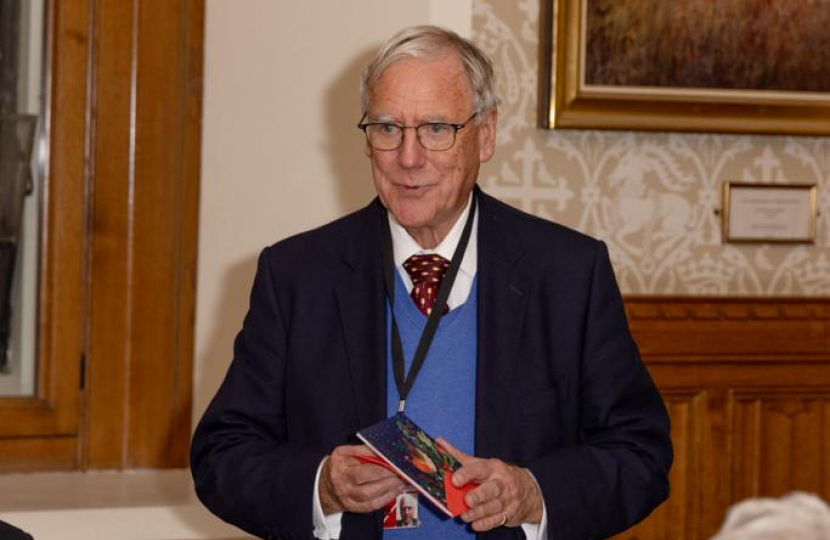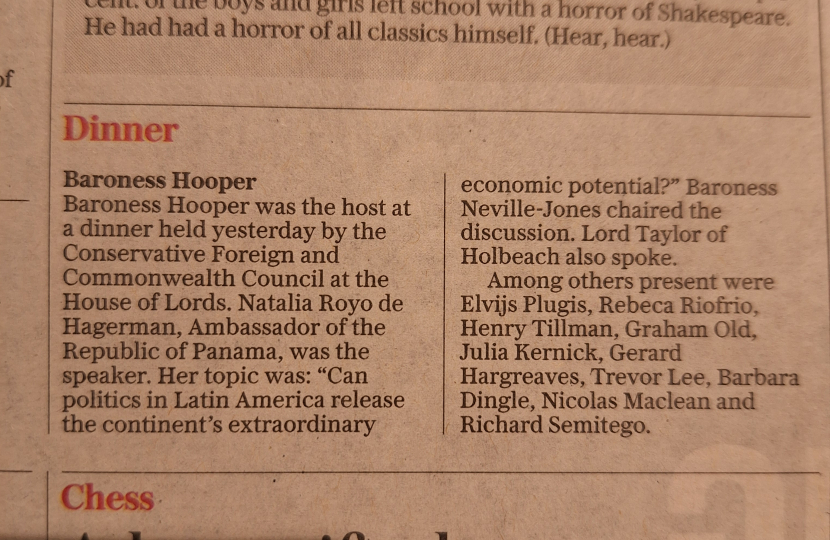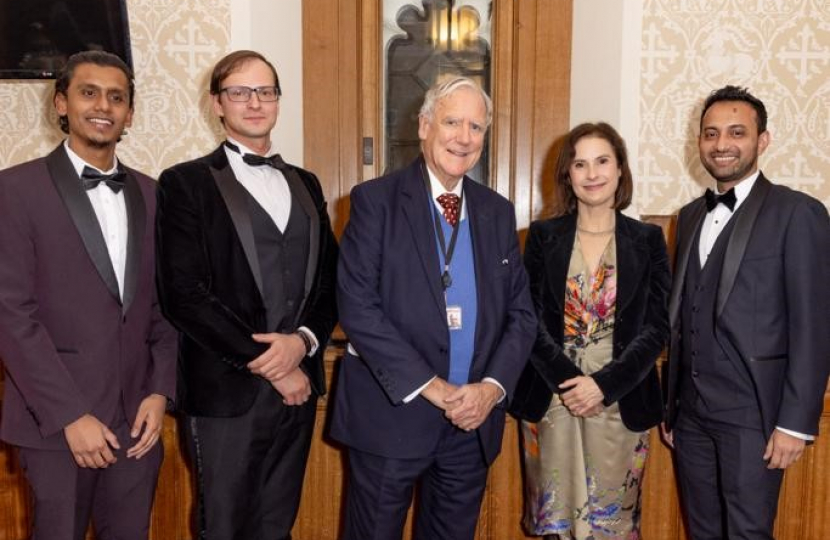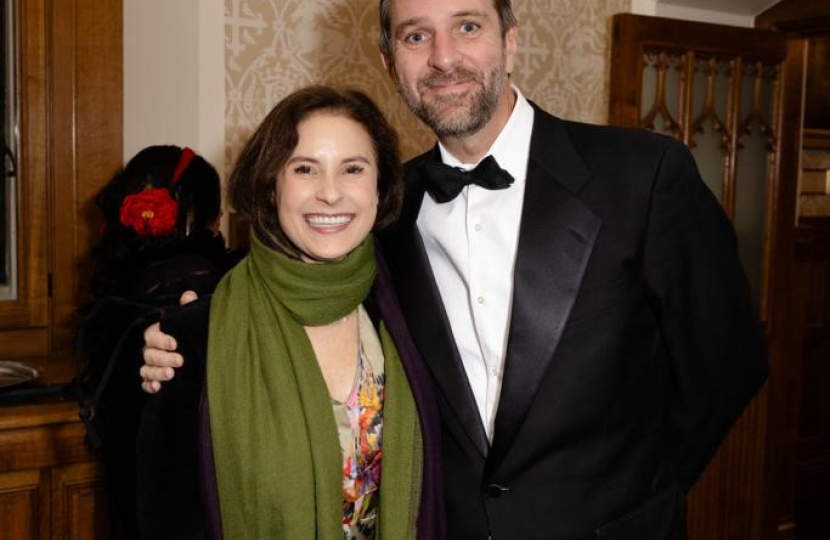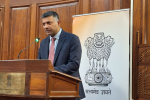Report on the CFCC dinner at the House of Lords, Monday 11th December 2023
Baroness Hooper hosted a Conservative Foreign & Commonwealth Council dinner for the Panamanian Ambassador, HE Natalia Royo de Hagerman, accompanied by her husband, The topic was “Can politics in Latin America release the continent’s extraordinary economic potential?”
Ambassador Royo started her address by highlighting two great champions for Latin America, both parliamentarians: Baroness Hooper, and in the nineteenth century George Canning. During a recent visit to Chile, Britain’s then Foreign Secretary James Cleverly has mentioned George Canning’s foresight in envisaging a time when Latin America would hold the balance of power in world politics. He had played a crucial role in enabling many Latin American countries achieve independence and had also understood the economic potential of the region.
The Ambassador quoted a few figures to illustrate this potential: a total market of over 650m people, representing around 8% of the world’s GDP. Moreover, the opportunities for growth were considerable. She also mentioned certain key environmental facts: Latin America was one of the most biodiverse regions of the world with around 60% of global land and water species, according to the United Nations Environment Programme. Latin America also had the most water resources in the world and some of the largest reserves of freshwater. Its per capita water endowment was nearly four times the global average, and the Amazon was world’s largest rainforest, the lungs of the planet, absorbing vast quantities of Carbon Dioxide.
In fact, Panama was one of the first three countries in the world to have become Carbon Negative, absorbing more carbon than it emits. Currently, only eight countries in the whole world have achieved that.
Panama was also part of the Eastern Tropical Pacific Marine Corridor, along with Colombia, Costa Rica and Ecuador, which was a biosphere reserve that creates the largest marine protected area in the world. In addition, Panama had established that 54% of its total marine area would be a Marine Protected Area. This made Panama the country with the second biggest Marine Protected Area in the world, after Palau.
The Ambassador also pointed out that Latin America was home to a number of agricultural superpowers, with the region feeding around 10% of the world’s population as one of the largest net food exporters globally. The region benefits from fertile soils and mild climates, which have made agriculture a major economic and social activity. Latin America was known worldwide for the exceptional quality of its coffee and cacao, fresh fruits and fisheries.
Turning to environmental issues, our speaker explained that due to climate change and because the region was heavily reliant on its natural resources and biodiversity for its development and prosperity, Latin American countries now faced an important challenge. To meet that challenge Latin America was a leader in clean energy with one of the cleanest electricity sectors in the world. According to the International Energy Agency, renewable energy, led by hydro, generates 60% of Latin America’s electricity, twice the global average.
In the case of Panama, the country was recognized by the United Nations as an “energy transition champion” just in 2022, with 97% of its energy generation coming from renewable sources, so that Panama ranks 8th in the world in the production of clean energy. Although this might sound like a contradiction, the extraction of resources through mining is essential to this global energy transition.
The Ambassador spoke very frankly about a recent case where the dilemmas of mining were confronted. The people of Panama had protested for many weeks against an open-cast copper mine, and in the end Panama’s Supreme Court had ruled that the contract was unconstitutional, a decision that might prove not be optimal in the future from an economic standpoint. The Panamanian government had emphasized the economic loss that would result from this decision, but this had been outweighed by the intense social pressure based on the case for the environment.
Taking Latin America overall, the region was incredibly rich in minerals and metals, (such as copper, lithium, and nickel), and these resources were needed for effective Climate Change transition. For instance, copper was vital for solar and wind energy and as a conductor for electricity. For Latin America to succeed in developing an efficient and sustainable minerals market, it must encourage and enable foreign investment while preserving its own self-sufficiency and the goodwill of local people and indigenous communities. The impact of mining activity must be balanced with proper reforestation, recycling, and newer and better green technologies, while ensuring that local communities and the host country receive fair and tangible benefits that continue beyond the extraction of the resource. The Ambassador summed this up as: responsible and sustainable mining; mining with principles.
Fresh from her attendance at COP 28, she then went on to underline that Latin America is a key player in the process of phasing out of fossils fuels in order to reduce greenhouse gas emissions and to move towards the global goal of achieving Net Zero emissions by 2050. Historically, Latin America had stood in an overlooked section of the global economy, but today was at the heart of the world’s transition to a green and sustainable economy. The region possessed and produced what the world needed: food and energy. And this was a statement which should not be taken lightly, considering global population growth and the urgent need to diversify the world’s energy matrix. The fight against climate change could not go on without Latin America, she declared.
Ambassador Royo then moved to another challenge, namely the greater instability of democratic politics due to Social Media. She said that information, both accurate and false, was widely and rapidly shared over Social Media, whose powerful nature was a double-edged sword and had taught us many lessons over the last few years. While Social Media had the capacity to help spread information, to keep leaders accountable, and to provide people with a means to be heard, it could also be damaging when used incorrectly or when the stakes were high, as in political elections, referendums, and decisions that affected a large number of people. History had shown us that one false “tweet” from a single person could have devastating consequences more broadly. Social media had become such a crucial part of our societies that we must learn how to manage the negative impact that false information could have. This would not be an easy challenge.
Looking more broadly at political challenges, the Ambassador said that based on history, statistics, and studies, we had learned that most of the political issues that Latin American countries face were rooted in inequality. The irony was that, although Latin America was one of the most resource-rich regions in the world, it remained among the most unequal, along with Sub-Saharan Africa. Countries in Latin America exhibited higher income inequality than those in other regions at similar development levels. Among the reasons for this were a lack of social and financial mobility, the drastic income gap, and high levels of wealth concentration that persisted across generations, coupled with racial and ethnic discrimination. These factors resulted in drastic differences in academic and labour market opportunities, endowments, and access to resources.
Ambassador Royo noted that 2024 would be a particularly important year for Latin American politics, when it would be worth paying especial attention to events in the Latin American hemisphere. Contrary to popular belief, leftist movements in Latin America were not against economic development; at the core of their intensive opposition was concern about structural inequality.
Fortunately, in the case of Panama’s recent history, political parties and government administrations had been balanced between centre left and centre right and consistently pro-business. Sadly, this had not been the case for every country in the hemisphere.
In the Ambassador’s view, education, job creation, tax reforms, financial inclusion, social security, quality public services, and fair income distribution remained key to reducing the social inequality, which the COVID pandemic had exacerbated. It was essential for public policies to incorporate ESG as a priority and to form alliances with the private sector to achieve positive change.
Ambassador Royo concluded by stressing Latin America’s invaluable potential for its own people and the world as a whole. However, without reducing inequality and maximizing foreign investment in a fair regulatory framework, this potential would remain untapped. Honest, forward-thinking governments should carry through consistent policies to enhance democracy, guided by the rule of law, in order to achieve economic sustainability.
Finally, inspired by George Canning’s legacy, the United Kingdom could become a key player in the economic and green transformation of the Latin American region through its policies, investment, and continuing support. The Ambassador pledged her Embassy’s commitment to achieving these goals and looked forward to further dialogue with members of the CFCC.
During the question and answer discussion, the importance of educational cooperation with the UK was emphasized. For instance, help was needed so that more students from Panama could come to study in the UK. Panama was grateful for Chevening programme opportunities, but cooperation needed to be increased so that more UK scholarships were made available to Panamanian students and, equally, so that Panama could reciprocate in the hosting of UK students. The Touring Scheme was a great programme, that should also be supported. For instance, 85 UK students went to Panama last summer to do social work in vulnerable communities.
When asked about the drought caused by El Niño, which had resulted in the reduction of the water needed for passage through the Panama Canal, the Ambassador replied that urgent measures had been taken by the government but that transit had necessarily been reduced from 35 to 22 ships per day. These were temporary measures until the rainy season arrived in April, but the Panamanian government was also looking for longer-term solutions, such as a new system that would provide water from nearby lakes in the area.
When asked about FATF, (the Financial Action Task Force), the Ambassador replied that Panama had officially been removed from the FATF grey list from October 2023. This was a crucial step in terms of international transparency and had positive implications for Panama’s economy and its attractiveness for foreign investors.
The dinner was sponsored by Grozeo and CFCC Chairman, Baroness Neville-Jones, gave the vote of thanks.
Nicolas Maclean
Photos credit: Mr Kam Murali

